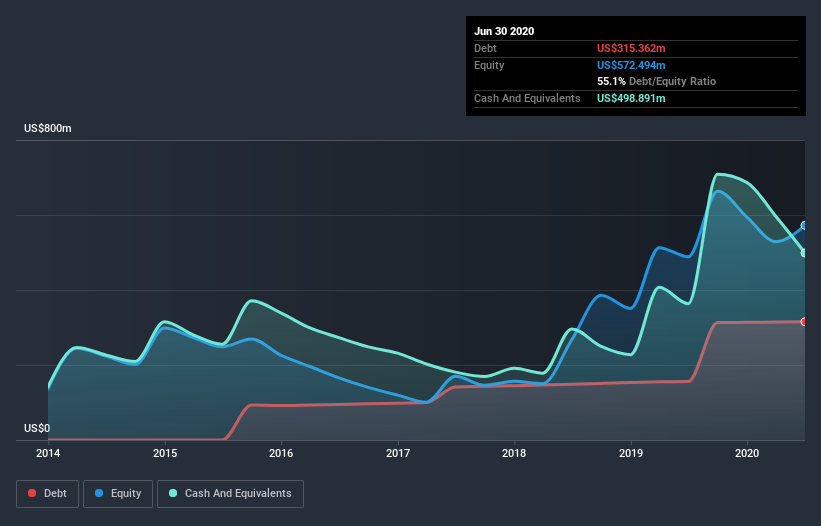Is Therapeutics (NASDAQ:PTCT) Using Debt In A Risky Way?

Warren Buffett famously said, 'Volatility is far from synonymous with risk.' So it might be obvious that you need to consider debt, when you think about how risky any given stock is, because too much debt can sink a company. As with many other companies PTC Therapeutics, Inc. (NASDAQ:PTCT) makes use of debt. But is this debt a concern to shareholders?
Why Does Debt Bring Risk?
Generally speaking, debt only becomes a real problem when a company can't easily pay it off, either by raising capital or with its own cash flow. In the worst case scenario, a company can go bankrupt if it cannot pay its creditors. However, a more common (but still painful) scenario is that it has to raise new equity capital at a low price, thus permanently diluting shareholders. Of course, debt can be an important tool in businesses, particularly capital heavy businesses. When we think about a company's use of debt, we first look at cash and debt together.
Check out our latest analysis for Therapeutics
What Is Therapeutics's Net Debt?
You can click the graphic below for the historical numbers, but it shows that as of June 2020 Therapeutics had US$315.4m of debt, an increase on US$155.7m, over one year. However, its balance sheet shows it holds US$498.9m in cash, so it actually has US$183.5m net cash.
How Strong Is Therapeutics's Balance Sheet?
According to the last reported balance sheet, Therapeutics had liabilities of US$201.8m due within 12 months, and liabilities of US$702.3m due beyond 12 months. Offsetting these obligations, it had cash of US$498.9m as well as receivables valued at US$53.6m due within 12 months. So its liabilities total US$351.6m more than the combination of its cash and short-term receivables.
Of course, Therapeutics has a market capitalization of US$3.53b, so these liabilities are probably manageable. However, we do think it is worth keeping an eye on its balance sheet strength, as it may change over time. Despite its noteworthy liabilities, Therapeutics boasts net cash, so it's fair to say it does not have a heavy debt load! The balance sheet is clearly the area to focus on when you are analysing debt. But it is future earnings, more than anything, that will determine Therapeutics's ability to maintain a healthy balance sheet going forward. So if you're focused on the future you can check out this free report showing analyst profit forecasts.
In the last year Therapeutics wasn't profitable at an EBIT level, but managed to grow its revenue by 12%, to US$311m. We usually like to see faster growth from unprofitable companies, but each to their own.
So How Risky Is Therapeutics?
We have no doubt that loss making companies are, in general, riskier than profitable ones. And we do note that Therapeutics had an earnings before interest and tax (EBIT) loss, over the last year. And over the same period it saw negative free cash outflow of US$221m and booked a US$432m accounting loss. While this does make the company a bit risky, it's important to remember it has net cash of US$183.5m. That means it could keep spending at its current rate for more than two years. Summing up, we're a little skeptical of this one, as it seems fairly risky in the absence of free cashflow. The balance sheet is clearly the area to focus on when you are analysing debt. However, not all investment risk resides within the balance sheet - far from it. Consider for instance, the ever-present spectre of investment risk. We've identified 1 warning sign with Therapeutics , and understanding them should be part of your investment process.
When all is said and done, sometimes its easier to focus on companies that don't even need debt. Readers can access a list of growth stocks with zero net debt 100% free, right now.
This article by Simply Wall St is general in nature. It does not constitute a recommendation to buy or sell any stock, and does not take account of your objectives, or your financial situation. We aim to bring you long-term focused analysis driven by fundamental data. Note that our analysis may not factor in the latest price-sensitive company announcements or qualitative material. Simply Wall St has no position in any stocks mentioned.
Have feedback on this article? Concerned about the content? Get in touch with us directly. Alternatively, email editorial-team@simplywallst.com.



